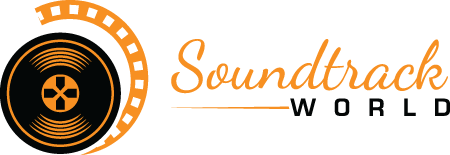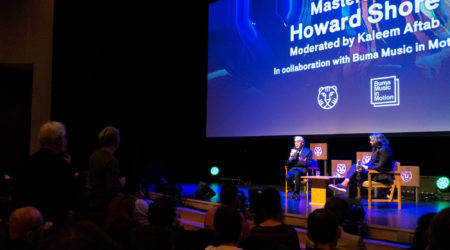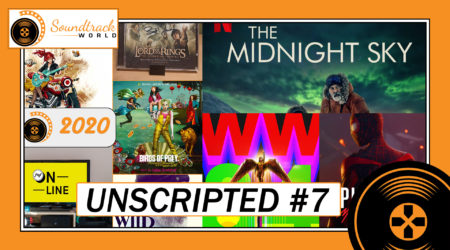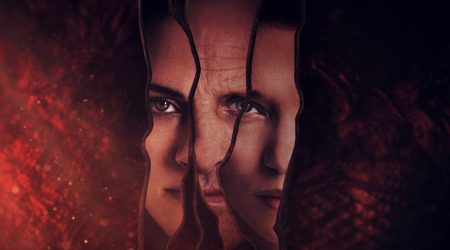The International Film Festival Rotterdam, the Netherlands, (IFFR) is one of the biggest film festivals in the world and since last year they, in collaboration with BUMA Cultuur, have been including film music in their program, starting off with composer Cliff Martinez as their first guest. This year they have invited none other than the Canadian composer Howard Shore, most famous for his music for The Lord of the Rings and The Hobbit. Those are not the only movies he has written the music for of course. He has provided the score for movies like The Fly, Dogma, Silence of the Lambs and Hugo, to name just a few. He has also composed the music for the cult movie Crash from 1995. On Friday, January 31, the Rotterdam Philharmonic Orchestra gave a special performance playing Shore’s music during the screening of said movie at the festival.
Thanks to the efforts of the organization of IFFR and BUMA Cultuur, I was able to have a conversation with the magnificent composer during their festival. The interview was held on January 28 in Rotterdam, during which we talked about The Lord of the Rings, his method of working in two worlds and several other things – giving us a glimpse into his creative mind.
Anton Smit: My first question is about the reason why you are here in Rotterdam. There will be a performance of your music during the screening of the movie Crash. What can the audience expect from that event?
Howard Shore: This is a live performance of the music from Crash. It is written for 14 musicians and 40 strings. The 14 musicians are an unusual combination, because the piece was originally written for three acoustic harps. It came about after M. Butterfly, which was set in China, for which I wrote a piece where I added another harp to the London Philharmonic Orchestra. I had two: left and right in stereo. Then I wanted to write a piece for surround, so I wrote a composition, a contrapuntal piece for three harps, for left, center and right, and that is the basis of the Crash score. I took that counterpoint and played it on six electric guitars an octave higher than the harp parts and then added three woodwinds and two percussionists, playing all metal percussion, really for detail and for some structure. The 40 strings were added to I think maybe three or four scenes in the film.
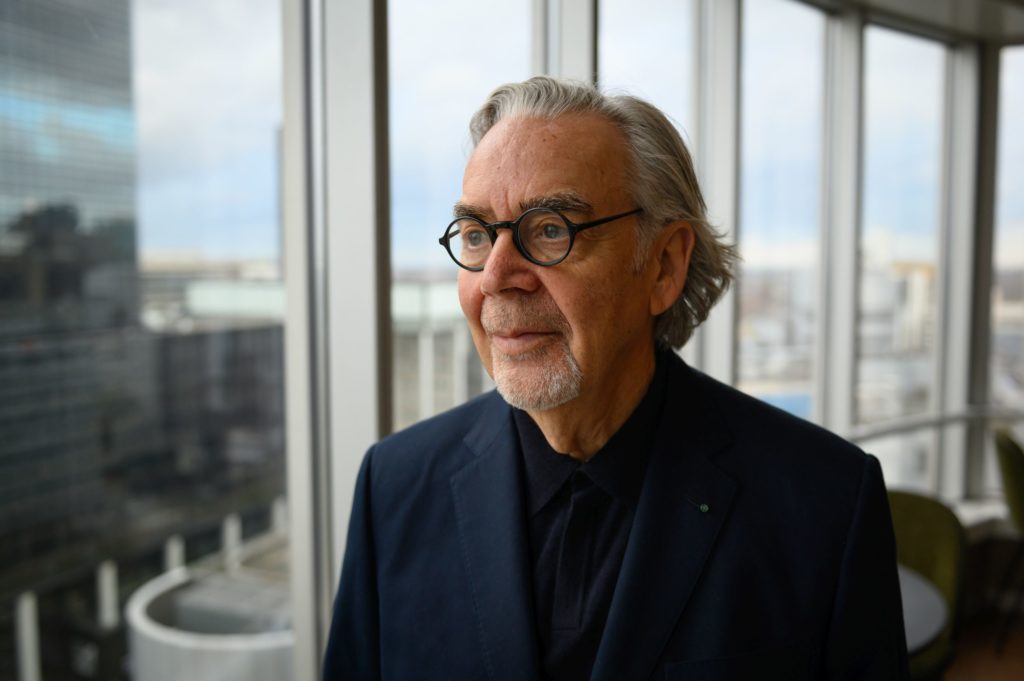
The reason for the performance came about through a screening of Crash at the Venice Film Festival last year. Bero Beyer, who is the head of the festival here in Rotterdam, and Jeremy Thomas, the British producer, were both there, and they came up with the idea of involving the Rotterdam Philharmonic in a live performance. They asked me about it and I went to work on the score. I had to restore the score.
AS: Was there not much left of the score, or was it just a matter of tweaking it here and there?
HS: Essentially film music is a recorded art. The scores you are making for the film are not really the scores you would use in a live performance. You have to create a new score to be able to go from scene to scene in a live performance, so there is a certain restoration that is involved. We have done quite a lot of restoration on The Fellowship of the Ring, The Two Towers and The Return of the King and also Naked Lunch was also restored for live performance. We had good knowledge of doing it, but still it took about five months, I think, to pull the original materials out of the archive and reset them for live performance, and there is also ten minutes of new footage that has never actually been seen. They were subtracted from Cronenberg’s cut when the film was originally released so it could get an R-rating. Now the ten minutes have been put back in, and it is now an NC17 Rating on the film.
AS: So for Crash you were creative with the three dimensions with the harps and the guitars. What I noticed about your scores for movies is that they are all quite different in instrumentations and ideas. What influences help you come up with such an idea for a score?
HS: My interest in film was the interest in music. I was working with film in a way to express some of the music ideas that I had over the years that I wanted to produce. I particularly wanted access to the recording studios to use as an instrument, which I did in early films like Scanners and Videodrome. Then I started working with orchestras, because it was another interest of mine to orchestrate and to be able to work with symphony orchestras. So I started to do movies like The Fly, M. Butterfly and Dead Ringers that use orchestras and a more symphonic sound. In Crash I am kind of combining both of those ideas. I am using electronics and also orchestral elements in the score. The interest in working with film is the interest of working with music, and that is why you have in my career very different types of orchestrations, for different films. That was really the fun of it. My background was in repertory theater. Film was a way for me to express a lot of different ideas that I had going on in my mind.
AS: Talking about orchestration, what I also noticed about your scores, is that for most movies, you do everything yourself: composing, orchestration and conducting. Is there any specific reason for that?
HS: It is control, because to me, the idea is coming from one source. It is not being diluted by other hands. All The Lord of the Rings scores I orchestrated, conducted and produced myself. I didn’t do it on every film. I mean there are scores that I have done that I haven’t orchestrated. The Fly was orchestrated by Homer Denison. He also did Dead Ringers, and there have been other people that I have worked with over the years. But for some projects if I am able and interested enough, in the time frame that I have, I will orchestrate it myself.
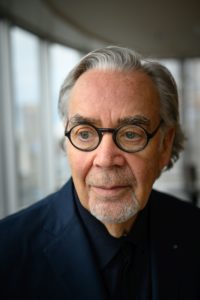
AS: Since you have already mentioned The Lord of the Rings, we, of course, have to talk about it, the score being your biggest achievement and winning an Oscar for you. Did you have the leitmotifs and themes beforehand or did you need the visuals of the movie to come up with the brilliant music for it?
HS: I did a lot of reading and research before I wrote anything on The Lord of the Rings. I had to catch up a lot on Tolkien’s work, the other books he had written. I also wanted to read other authors that had been influenced by his work, so there was a lot of catching up to do. I had to learn about the ring mythology and I had to understand his languages to use them in the film, before I wrote anything. In 2000 I went to New Zealand and I saw some of the film and when I came back I wrote The Fellowship and The Shire themes. They came quite freely, they kind of revealed themselves one day, and I did not change them much: those were the themes I used throughout the whole film. Over the course of almost four years, I developed over a hundred themes and leitmotifs for the film.
AS: After the first movie was such a hit, there were still two other movies that needed music, did the success of the first movie change your writing in any way?
HS: Something unusual happened with that trilogy, where each film is actually a development of the one before. There are elements in The Return of the King that you don’t have in The Fellowship of the Ring. It is unusual for a trilogy to actually grow in that sense. The first one was good and it was successful, it was critically acclaimed. I think it won a few awards and then the second one gained a little more interest, and then for the third one people were so interested in these three films now. I think that the third one is really brilliant film making, sort of the cumulation of all the years of work. After The Fellowship of the Ring, the pen rested for a moment but then I went back to The Two Towers. I had the thematic ideas from Fellowship, but I was now going into whole new territory. Once you go to The Two Towers, after the breaking of the fellowship, the story splinters, and the fellowship goes in different directions. There are new adventures in all these different directions, so a lot of new music had to be written for every film.
AS: Let’s talk about a specific scene, like for example The Lighting of the Beacons. How does the music for such a strong scene come to be?
HS: That piece was written rather fluently. By the time I had finished The Fellowship of the Ring I was tuned up. I was so involved and so deep into Tolkien’s world. When I saw The Lighting of the Beacons, it is so beautifully shot, all that aerial photography, and the editing is beautiful and it was such a challenging piece to write, but it just came rather freely. It is a type of counterpoint that I was developing a little bit in Fellowship, but now I had this scene and I could develop it further. It is what I was trying to say earlier, is that a lot of my interest in film was through music. I was kind of developing my compositional ideas by working in films and that is how something like The Lighting of the Beacons. You may have thought of that piece and would have loved to have written that, but you did not necessarily have the opportunity to write that kind of piece, for a concert work or commissions. It was a way to express a lot of different ideas. The Lighting of the Beacons is a piece that was written rather fluently and interestingly enough the recording is one take. It is the original recording, the first take, by the London Philharmonic. I think it was the first thing we recorded after the break. We had finished Fellowship, then we took the winter break and all that, and we came back and I wrote that piece. I think we got together in the summer or the spring in maybe 2002. We set the mics up and I conducted the first take and boom, that was what went in the film. A very exciting performance.
AS: After writing for so many years did your method of composing change a lot? Are you sticking with what works, the old-fashioned way, or did you embrace some technology?
HS: No, I am not old-fashioned. I write and work in two worlds. I write in 19th-century world, where I don’t use computers and I am writing with pencil and paper, and orchestrating in ink on thirty stave paper. I then work in a 21st-century world with all the technology. I have two buildings that I work in. One is a 19th-century setting and the other one is 21st-century technology. When you work on films you need to be able to communicate and in this technological building I can communicate all over the world. I have done recording there in Berlin, London, Los Angeles, New Zealand and Australia. I use the technology as a second stage. The first stage is always 19th-century music composition.
AS: For my final question, at the festival you will be giving a personal master class for a small group of aspiring composers. For those who cannot attend, do you have a small piece of advice?
HS: I would say, learn your craft. Learn standard and avant-garde composition techniques for film. Learn how to orchestrate. Learn to work with computers, because you are going to need to work with technology if you are going to work in film, and learn the art of the recording studio: microphone and recording techniques, these are all things. Of course, learn to collaborate with artists and directors. It could be an editor, that you want to work with. Find your peers: find a group you want to work with as I did with the Cronenberg group, and that allowed me a lot of expression in music over 15 films. Those would be my advice for younger composers.
AS: That is a very nice conclusion to this interview!
